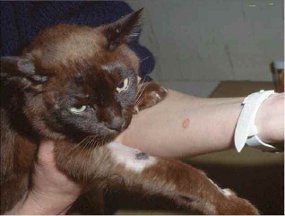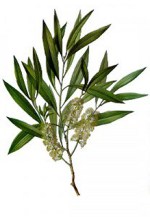 Ringworm isn’t caused by a worm; it’s a highly contagious fungal infection. It’s also zoonotic, meaning the infection can be transmitted to people. In both people and pets, the young are more susceptible, so ringworm is quite common in puppies and kittens, particularly kittens.
Ringworm isn’t caused by a worm; it’s a highly contagious fungal infection. It’s also zoonotic, meaning the infection can be transmitted to people. In both people and pets, the young are more susceptible, so ringworm is quite common in puppies and kittens, particularly kittens.
You will recognize ringworm on your pet if you see small, round areas of thick, red, irritated skin and missing hair. Itchiness from the irritation is possible, but not necessarily a symptom. The fungus starts at a central point and spreads out in concentric circles. Sometimes they look like rings, sometimes they don’t, which is why you need a veterinarian’s help to obtain a proper diagnosis. You might also be able to see the actual fungus that forms around the affected areas, as it will appear as white, scaly skin.
Ringworm infections are a reflection of your pet’s overall health. Healthy animals don’t have problems with ringworm. Unhealthy animals can become riddled with ringworm that spirals out of control. If the infection spreads to cover most of your pet’s body, you have a very serious condition to deal with.
 Because of its contagious nature, be very careful about spreading ringworm. If you have children at home, you may want to quarantine your infected animal from them until the condition is remedied.
Because of its contagious nature, be very careful about spreading ringworm. If you have children at home, you may want to quarantine your infected animal from them until the condition is remedied.
If you see irritated patches of skin that are rather round in shape, see a holistic veterinarian for help with diagnosis and treatment. In some cases, ringworm clears up on its own. Other times your holistic veterinarian may want to prescribe oral and topical medications to help speed up recovery. Proper hygiene and sanitation of your home and pet’s environment is important.
Herbal and Naturopathic Help
Holistic veterinarians recommend starting treatment by fasting your pet, usually for two days. See Fasting for details. After the fast, if your pet has not been on a natural, well-balanced, raw meat diet, now is the time to start. See the section on diet for more information. Proper nutrition is essential. A healthy animal is able to fend off all sorts of diseases and ailments.
Zinc, lecithin, and essential fatty acids are helpful supplements in the fight against ringworm. Give about 1 mg of zinc per each pound of body weight, and ½ to 2 teaspoons of lecithin, depending on the animal’s size. For example, a thirty pound dog would get 30 mg of zinc and about a teaspoon of lecithin added to each meal. Also add ¼ to 1 teaspoon of fish oil, depending on your pet’s size. Olive leaf extract, noni powder, and grapefruit seed extract can also be helpful when fighting fungal infections.
Also treat the problem topically. Clipping the hair around the affected area makes topical solutions easier to apply, and makes it more difficult for the infection to spread. If you clip the hair, be careful not to injure the skin. Judiciously dispose of the clippings and sanitize the floor and surrounding area. People and pets coming into contact with the clipped hair can easily become infected.
 What to use as a topical antifungal? Currently this is a subject of controversy. For years, tea tree oil (diluted) was often touted as a natural product to use for ringworm and other fungal infections. However, many people advise not to use tea tree and other essential oils on pets, particularly on cats. They say that tea tree oil isn’t metabolized in cats the same way as it is in people, and it can build up internally and become toxic.
What to use as a topical antifungal? Currently this is a subject of controversy. For years, tea tree oil (diluted) was often touted as a natural product to use for ringworm and other fungal infections. However, many people advise not to use tea tree and other essential oils on pets, particularly on cats. They say that tea tree oil isn’t metabolized in cats the same way as it is in people, and it can build up internally and become toxic.
This can be true of many topical and oral medicines, though. The amount of the dose determines whether a treatment is helpful or harmful, and that applies to all sorts of products from prescription drugs to herbal remedies. Any fat soluble product will build up in an animal’s system, and this includes humans. This is why you need to be careful with vitamins A, D, E and K.
One of the reasons essential oils such as tea tree can be dangerous to pets is that the animal will lick the treated area. If possible, apply a bandage after you apply any topical treatment. Gauze pads, rolled gauze and paper tape are good tools for this task.
Other products used historically for ringworm include iodine, bleach and vinegar. All of these may be harsh, and may have adverse effects. The ringworm, however, is also a danger to your pet. There is no “perfect” cure for some conditions. With ringworm, it’s essential that you seek advice from a holistic veterinarian. If you do decide to try one of these topicals, we recommend apple cider vinegar. But be aware that just because it is made from apples doesn’t make it any less acidic. Full strength apple cider vinegar can burn the skin. Mind you, it’s this reaction that kills the ringworm.
Sometimes conventional medicine is the best treatment. Your veterinarian may prescribe an antifungal cream. The veterinary antifungals usually have the same active ingredients as human antifungals, with ingredients such as clotrimazole. You can find these in the athlete’s foot section of your local drugstore, but please consult a holistic vet first.
Another topical strategy is to smother the ringworm. This is a method commonly used for lice and fleas, and some old concoctions contained ingredients like sulfur and petroleum jelly. We don’t know if the smothering method actually works on ringworm, a fungus, so we recommend consulting an expert before trying such a remedy. And, as mentioned above, bandage the area after treating it so your pet won’t lick the medicine.
Grapefruit seed extract can be used topically on the ringworm, and can also be added to your pet’s food. Consult a holistic veterinarian for an appropriate dose for your dog or cat’s particular situation. You can also make a grapefruit seed extract rinse using about fifteen drops of extract per cup of water or tea. Massage this rinse all over your pet’s body, except near the eyes, and don’t rinse it out.
A lesser known treatment is Usnea. Usnea is the genus name for some species of lichen. Dried Usnea, powdered and made into a paste, has been reported to work well on ringworm.
Whatever you do, don’t let ringworm get out of control. While it may clear up on its own, it also may get out of control and become a serious problem. Consult a holistic veterinarian if you suspect your pet has ringworm.
Homeopathy
There are several homeopathic treatments for ringworm, but we recommend you consult with a homeopathic veterinarian before using them. The homeopathic treatment of choice seems to be Sulphur. If you do use a sulfuric treatment, tell your veterinarian about any topicals you plan on using, because some, such as tea tree oil, counteract the efficacy of sulfur.